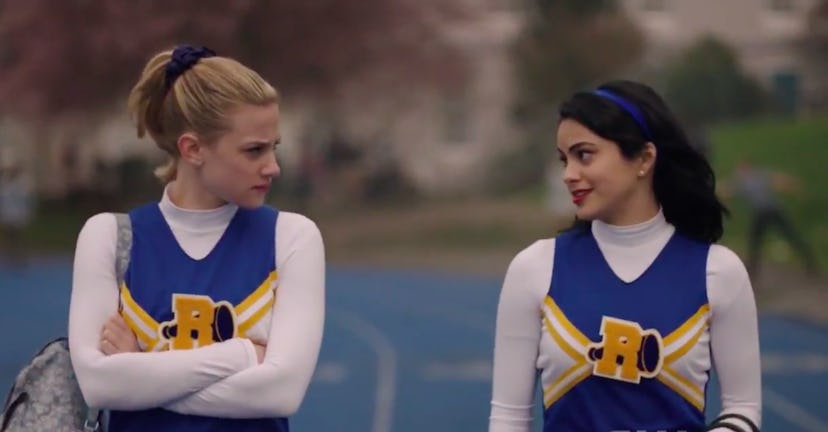An Appreciation of the Unexpected Feminism in Riverdale
The CW’s reinvention of the Archie comic books is a contemporary update in many ways—most notably, its newfound feminism.

In the beloved, long-running Archie comic books, everything centers on maybe the most iconic American love triangle of all time: high schoolers Archie Andrews, gingery “nice guy,” Betty Cooper, the blonde girl next door, and Veronica Lodge, the spoiled, raven-haired vixen. Whenever things inevitably go off the rails, Archie is rarely, if ever, at fault. It’s always the two girls who are left to duke it out as prototypical frenemies. Occasionally, the fiery Cheryl Blossom is thrown in the mix so Betty and Veronica can join forces against her. All of which is to say: Archie, pleasurable diversion though it is, has never been a feminist masterpiece.
This makes it all the more pleasantly surprising that Riverdale, the CW’s reimagined Archie TV adaptation, is, in fact, low-key feminist. The show isn’t just the classic Archie narrative in a modern, social-media-savvy world, nor does it eschew the original storyline entirely in favor of something more up-to-date. Instead, Riverdale addresses the shortcomings of the comic books’ misogynistic worldview, while reintroducing us to these female characters who are now complex beyond those good girl/bad girl stereotypes. Rather than fight amongst themselves, these young women work together to navigate the pervasive sexism that thrives in any American high school. (There’s also a murder mystery, because every suburban drama seems to be backgrounded by one these days.)
When we are first introduced to Riverdale’s Betty and Veronica (played by Lili Reinhart and Camila Mendes, respectively), it feels as though the series would follow the template laid out by the comics. Both girls think Archie (K.J. Apa) is, like, totally hot; the girls are already feuding over an ill-fated game of “Seven Minutes in Heaven.” But by the end of Episode 2, they have explicitly agreed to never let Archie (or any boy, for that matter) come between them again. Seven episodes later, they have yet to break that promise. The firmness of their bond throws the real problem into relief—the reality is, “nice guy” Archie is an aloof jerk. Betty and Veronica are better off without him. Even if, sometimes, they get to objectify him.
How do you like it, Archie?
So who are the thoroughly modern Betty and Veronica? At first glance, Betty is still literally the girl next door. She’s cute, earnest, and has been known to watch Archie take his shirt off through her bedroom window. As the series plays out, however, we see Betty develop a new sense of purpose as she works tirelessly (alongside Jughead, played by teen heartthrob Cole Sprouse) to solve the murder of Jason Blossom, the football captain who once dated her older sister, Polly. She’s clever and resourceful with a penchant for justice. She also has a thing for Jughead now (it’s still a CW teen drama, after all).
Meanwhile, Veronica, who relocated to Riverdale with her mother after her father was incarcerated, finds herself ripe for reinvention. Rather than carry on as the mean girl she was back home, she’s steadfastly committed to supporting her new female friends, namely Betty, in any way possible, all while dealing with the absence of her father.
In Episode 3, after going on a seemingly innocuous date with one of the football jocks, Veronica is very publicly slut-shamed for an act she didn’t even commit. To make matters worse, a classmate, Ethel Muggs (played by Shannon Purser aka the beloved Barb from Stranger Things) informs Betty and Veronica that the football team keeps a very official, handwritten “playbook” of all of their sexual conquests (one would think that by now it would have been transferred to a Google Doc). By episode’s end, Betty and Veronica had confronted and, with the help of Ethel and even resident villain Cheryl Blossom, exposed the football team for their misogyny.
It isn’t just Betty and Veronica who have gone “girl power” in Riverdale. Version 2.0 of Josie and the Pussycats, the local band with “long tails and ears for hats,” is comprised of three black superstars who are each dedicated to their art and proactive in their nascent careers. When Archie first approaches the Pussycats to help him with his songwriting (Archie is still a Renaissance man), the Pussycats coolly dismiss him—they have more important things to attend to. (It’s possible no female character ever said no to Archie Andrews in the early comics.) Gone, too, are the days of Melody, the blonde bimbo who was so unrealistically dimwitted it was a miracle she could figure out how to put on her catsuit.
Granted, when it comes to female empowerment, Riverdale doesn’t always hit every right note. Most notably, it’s strange that a show built around a murder would still have Veronica scoffing at the very notion of having sex on the first date. Without a more realistic depiction of how teenagers today approach sexuality, some of these poignant plotlines lose a little of their bite.
Still, Riverdale provides one example of how a beloved but antiquated property can be adapted into something worth discussing in the cultural conversation now. Sorry, Archie Andrews, the world no longer revolves around you, but rather those two exceptional women you took for granted all those years.
Watch 62 fashion insiders speak out on Women’s Day: